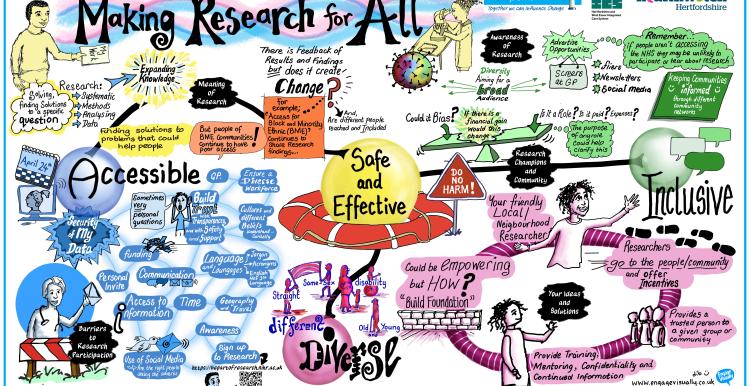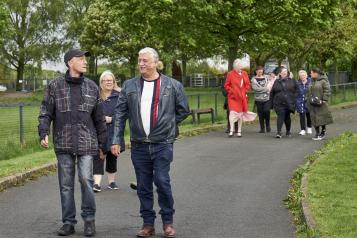Making Research Inclusive for All

After supporting the Hertfordshire and West Essex Integrated Care System (ICS) to help get more people involved and included in research last year, our work was shortlisted for a Clinical Research Network (CRN) East of England award for “Inclusive Working”. It was praised for ensuring research was delivered with equality, diversity and inclusivity.
Given this success, the ICS received additional funding from NHS England to continue a second phase of work through the Research Engagement Network (REN).
We once again took the role of lead partner for the Voluntary, Community, Faith and Social Enterprise (VCFSE) sector and supported with project management of the programme, engaging with diverse communities about NHS research.
What we did
Through one-to-one interviews and focus groups, we engaged with adults with learning disabilities, children and young people and people with a lived experience of mental health and/or addiction. We worked in partnership with Herts People First, Viewpoint and the University of Hertfordshire’s Young People’s Advisory Group and spoke to 61 people.
We found:
- Awareness of research opportunities needs to be improved, using a range of communication methods and outreach initiatives.
- Mistrust is a significant barrier preventing research participation. This is underpinned by concerns about privacy and confidentiality, previous experiences of discrimination and challenges around feeling represented and included.
- Practical barriers such as time constraints, travel/location and financial concerns can stop people from taking part in research.
- Accessibility was a challenge for many – including language and communication barriers and lack of accessible information.
- Communities felt researchers lack cultural competency and are not proactive in welcoming and including diverse groups in research.
- Communities called for greater choice, accessibility, flexibility and cultural competency to enable more inclusive participation.
- Recruiting research champions could bridge the gap between communities and researchers.
- Communities were interested in being involved in a community-led research project to address their needs and priorities.
A graphic illustrator captured the discussions from two of the focus groups. The illustrations and the full report can be downloaded below.
Follow-up events
In April and May we then attended three community events across Hertfordshire, engaging with members of the public about their views on NHS research. We will be sharing more information about the outcomes of these events soon.
What happens next
To address the suggestions and concerns raised by communities, the ICS has allocated funding to:
- Translate research materials into accessible formats, such as different languages, Easy Read and British Sign Language.
- Develop a community-led research project.
- Recruit research champions to promote and share opportunities.
- Advertise the Be Part of Research Scheme in a range of community settings.
- Allow researchers to hire community spaces and remunerate participants for their involvement.
We will continue to support the ICS with its ambitions to make NHS research more inclusive and this work has already helped shape and inform the ICS Research, Innovation and Evaluation Strategy.


